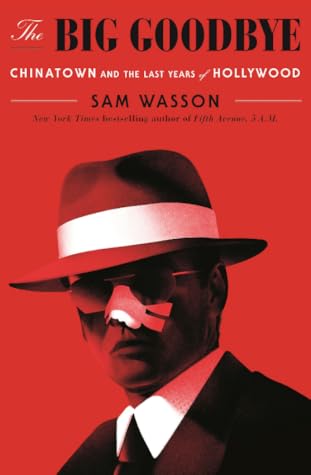More on this book
Community
Kindle Notes & Highlights
by
Sam Wasson
Read between
August 8 - September 22, 2020
Robert Towne once said that Chinatown is a state of mind. Not just a place on the map of Los Angeles, but a condition of total awareness almost indistinguishable from blindness. Dreaming you’re in paradise and waking up in the dark—that’s Chinatown. Thinking you’ve got it figured out and realizing you’re dead—that’s Chinatown.
Despite even the facts, “could” forever opens the aqueduct of nightmares that eyes don’t see.
It was a kind of dreamer’s physics: For every California promise, there was an L.A. disappointment.
Sylbert had personally selected each book on George and Martha’s shelves. Here realism and precision went hand in hand: The book titles elevated the characters from generic types to actual, specific individuals.
She understood context, that every context had a context, and that no truth—if such a concept even existed—could ever be grasped in isolation.
“It was the ending,” Towne would say. “There were so many, but that was the end of the Sixties. The door closed, the curtain dropped, and nothing and no one was ever the same.”
Jack himself was “the Weaver” for the way he discoursed in long, rambling sentences—“I like the stream-of-consciousness approach”—crammed with philosophical ponderings and Big Ideas on Life and Art and Love. That’s what acting, he would say, is all about. Acting is everything.
“Los Angeles, it should be understood, is not a mere city,” wrote Los Angeles historian Morrow Mayo. “On the contrary, it is, and has been since 1888, a commodity; something to be advertised and sold to the people of the United States like automobiles, cigarettes, and mouthwash.”
“When a crime can no longer contain or content itself with the past,” Towne said, “and insists on visiting the future it’s no longer a crime—it becomes a sin, and very difficult to punish.”
“Memories swell [like a bee sting],” he wrote. “When we first feel them in our skin there’s that breathcatching moment before knowing whether we’ll feel grief or joy.”
I increasingly feel—I suspect we all do—that the history of life on earth is not one of evolution so much as devolution. With each succeeding generation we get weaker and smaller; the Titans are always in the past.”
Distraction—this was how it always started. “So much of writing,” he said, “is trying to avoid facing it.”
His limit was Chinatown: “What do you do there?” “Nothing.” “What do you mean, nothing?” “Well, that’s pretty much what we’re told to do in Chinatown, is nothing. Because with the different tongs, the language and everything else, we can’t tell whether we’re helping somebody commit a crime or prevent one.…”
as Evans, borrowing from Seneca, liked to counter, crossing his ankles on the coffee table: “Luck, my friend, is where opportunity meets preparation.”
always thought that Hemingway’s The Old Man and the Sea was about the creative process,” he said. “The old man was good enough to hook the big fish, but he wasn’t strong enough to reel it in. That’s the tragedy of it. He could conceive of a great novel but couldn’t complete it, and eventually he blew his brains out.”
It’s always the same story. The screenwriter, Towne said, begins “dreaming a dream. The job is to make a dream come true.”
“When man walked on the moon, some romantic idea of the moon was over.
Bart actually kept a notebook of all the lies he had to tell: “Lies,” he said, “are the way to get a movie started: ‘So-and-so’s really interested.’”
Can anyone say, with precision and certainty, when a golden age begins and ends? Can they be separated from the bronze? Or are they the colors of the rainbow, consigned to secret delineation? Once upon a time, there really were wardrobes, distinct pieces tailored to each separate occasion, shoes for lunch, the right shoes for dinner. There were hats. There were hatpins. Engaging the beauty and romance of clothing had dignified behavior, she thought, bettering the way one thought and felt about oneself and the world. “Today,” she said, “with all our pretensions of being free, we really are more
...more
Then a little basketball, maybe shoot some pool to the music of a beatnik soliloquy from Jack, who just discovered the undying combination of black Ray-Bans and Camus.
émigré, twelve-tone composer Arnold Schoenberg: “I have come to a country where I am allowed to go on my feet,” he lectured a gathering of UCLA students, “where my head can be erect, where kindness and cheerfulness dominate and where to live is a joy, where to be an expatriate of another country is the grace of God.”
the wreckage of Chinatown, transmitted metaphorically, transcends its story and characters. Chinatown is a condition. The condition is the terrible awareness of one’s helplessness, what Towne had always called “the futility of good intentions.”
In a memo Eisner would circulate through Paramount, he wrote: “We have no obligation to make history. We have no obligation to make art. We have no obligation to make a statement. To make money is our only objective.”
Christopher Lasch, in his 1979 The Culture of Narcissism: American Life in an Age of Diminishing Expectations, observed: “Since the ‘society’ has no future, it makes sense to live only for the moment … to become connoisseurs of our own decadence, to cultivate ‘transcendental self-attention,’” to become, in short, narcissists, who, bereft of faith, live by a survivalist mentality, “expressed in its crudest form in disaster movies,” seeking escape in fame, sex, power, drugs—any delusion to resist the growing awareness of failure and futility. Drugs, addictions to wealth, celebrity, quick
...more
“The world,” Nicholson predicted, “is going to miss the movie-going experience.”


